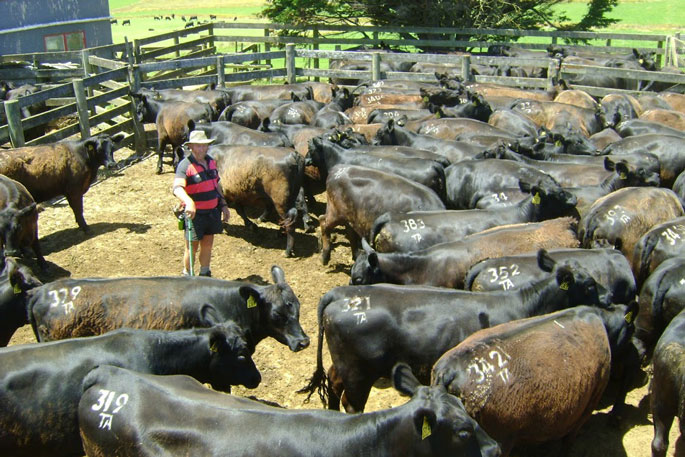Concerns about high interest rates, poor commodity prices and excessive red tape are weighing heavily on farmers, but rural confidence has risen from last year’s record lows.
Federated Farmers’ latest Farm Confidence Survey shows there’s been a positive shift in the rural mood since 2023, when confidence reached its lowest point in the survey’s 15-year history.
"It’s good to see the first improvement in farmer confidence for quite some time now," Federated Farmers national president Wayne Langford says.
"I want to be clear that it’s only a slight improvement and it’s coming off a very low base. I wouldn’t say farmers are feeling more confident yet - they’re just feeling less unconfident.
"Confidence is no longer going backwards, but it’s still in the gutter."
Langford says farmers are struggling with high inflation, high interest rates and lower commodity prices, and the impact of those on their profitability.
"Most farmers are still feeling that general economic conditions are bad, and most are still making a loss.
"Where we are seeing a shift is in the number of farmers who expect things will improve in the next 12 months. So, times are tough, but there’s a sense of cautious optimism."
Compared to last July, the January 2024 survey shows more farmers expect their production and spending to increase, and fewer farmers expect their debt to increase, in the 12 months ahead.
Langford says there are a number of drivers behind the confidence recovery.
"Inflation is slowing, interest rates are high but have hopefully peaked, and commodity prices - at least for dairy - seem to have stabilised.
"We’ve also seen a change of Government in the last six months, with a real commitment to roll back some of the more impractical and expensive regulation that’s undermined farmer confidence."
He’s optimistic this is the start of a genuine, steady increase in confidence.
"I think we will see confidence continue to lift in the year ahead, helped by an easing of unnecessary regulatory pressure on farmers.
"Federated Farmers is working hard with the new Government to reduce that burden, like fixing unworkable freshwater rules.
"It's all about cutting red tape, making compliance on-farm easier, and getting our primary sector humming again."
The survey identified farmers’ biggest concerns right now as: debt, interest and banks; farmgate and commodity prices; regulation and compliance costs; and climate change policy and the ETS.
Langford isn’t surprised to see interest rates came out as the top concern.
"I've spoken to a lot of farmers who are getting work off-farm just to make ends meet. It’s exactly why Federated Farmers have been calling for an independent inquiry into rural banking.
"Farmers need to know why interest rates for rural lending have gone up so much more than for residential. That margin between rural and residential has shifted significantly and it’s left farmers feeling confused and frustrated.
"An inquiry would provide that transparency and give farmers some confidence that they’re at least getting a fair deal from their bank."
He encourages any farmers who may be struggling to reach out for support.
"Even though we’re talking about a slight confidence lift, it’s still extremely tough for farmers out there, so please reach out to the likes of Federated Farmers and Rural Support Trust if you need help."
Read the January 2024 Federated Farmers Farm Confidence Survey results at fedfarm.org.nz/FarmConfidence.
Listen to Wayne Langford and Auckland farmer Tim Dangen discuss the state of rural confidence in episode four of the Federated Farmers Podcast - fedfarm.org.nz/podcast.
January 2024 Federated Farmers Farm Confidence Survey key points:
- General economic conditions (current): A net 55 per cent of respondents consider current economic conditions to be bad, a 25-point improvement from July 2023 when a net 80 per cent considered conditions to be bad.
- General economic conditions (expectations): A net 0.9 per cent of respondents expect general economic conditions to improve over the next 12 months, a 71-point improvement from July 2023 when a net 70 per cent expected conditions to deteriorate.
- Farm profitability (current): A net 3.1 per cent of respondents report making a loss currently, a 4.9-point worsening from July 2023 when a net 1.8 per cent reported making a profit.
- Farm profitability (expectations): A net 21 per cent of respondents expect their profitability to decline over the next 12 months, a 49-point improvement from July 2023 when a net 70 per cent expected it to decline.
- Farm production (expectations): A net 6.0 per cent of respondents expect their production to increase over the next 12 months, a 13.5-point improvement from July 2023 when a net 7.5 per cent expected it to decline.
- Farm spending (expectations): A net 4.0 per cent of respondents expect their spending to increase over the next 12 months, a 15-point improvement from July 2023 survey when a net 11 per cent expected their spending to decrease.
- Farm debt (expectations): A net 0.3 per cent of respondents expect their debt to increase over the next 12 months, down 14 points from July 2023 when a net 14 per cent expected their debt to increase.
- Ability to recruit (experienced): A net 23 per cent of respondents reported it has been harder to recruit skilled and motivated staff over the past six months, down 9 points from July 2023 when a net 32 per cent reported it had been harder.
- Greatest concerns (current): The four greatest concerns for farmers are Debt, Interest & Banks; Farmgate & Commodity Prices; Regulation & Compliance Costs; and Climate Change Policy & ETS. The proportion considering their concerns are affecting their mental health & wellbeing fell from 69 per cent in July 2023 to 52 per cent in this survey.
- Highest government priorities: The four highest priorities farmers want the Government to address are Fiscal Policy; Economy & Business Environment; Regulation & Compliance Costs; and Monetary Policy.



0 comments
Leave a Comment
You must be logged in to make a comment.